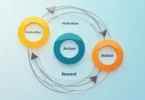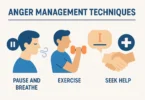Success in the workplace isn’t just about technical skills or job expertise—it’s also about how well you understand and manage emotions. Emotional Intelligence at Work (EI) is the secret ingredient that separates great professionals from the rest. It shapes how we interact with colleagues, handle stress, resolve conflicts, and lead teams effectively.
Coined by psychologist Daniel Goleman, emotional intelligence consists of five key elements: self-awareness, self-regulation, motivation, empathy, and social skills. These abilities determine how well we navigate workplace dynamics, adapt to challenges, and build strong professional relationships.
In today’s fast-paced and often high-pressure work environments, those with high emotional intelligence excel in leadership roles, foster teamwork, and make better decisions under stress. But the good news? Emotional intelligence isn’t just an inborn trait—it’s a skill that can be developed and strengthened.
In this guide, we’ll explore why emotional intelligence is essential for workplace success, how to improve it, and how it can boost your career growth. Let’s dive in!
Headlines:
Why Emotional Intelligence (EI) is Crucial for Workplace Success
- The Role of Self-Awareness and Self-Regulation at Work
- The Impact of Emotional Intelligence on Leadership and Teamwork
How to Develop and Improve Emotional Intelligence at Work
- Practical Strategies for Building Self-Awareness and Empathy
- Emotional Intelligence Training and Professional Growth
The Long-Term Benefits of Emotional Intelligence in Your Career
- How (EI) Enhances Decision-Making and Problem-Solving
- Emotional Intelligence as a Key to Career Advancement
Why Emotional Intelligence (EI) is Crucial for Workplace Success
The Role of Self-Awareness and Self-Regulation at Work
In a fast-paced work environment, emotions can either fuel success or create unnecessary obstacles. Self-awareness and self-regulation, two core components of emotional intelligence at work, play a crucial role in managing emotions, improving decision-making, and fostering a positive workplace culture. Professionals who master these skills are better equipped to handle stress, navigate workplace relationships, and maintain productivity even in high-pressure situations.
Understanding Self-Awareness in the Workplace
Self-awareness is the ability to recognize and understand your emotions, thoughts, and behaviors and how they impact your work and interactions with others. This skill is essential in professional settings because it allows employees to:
- Recognize Emotional Triggers: Being aware of what situations cause frustration, stress, or excitement helps professionals manage their responses effectively.
- Understand Strengths and Weaknesses: Self-aware employees can leverage their strengths to excel in their roles while actively working on their weaknesses.
- Enhance Communication Skills: Recognizing personal communication styles and emotional responses helps in expressing thoughts more clearly and professionally.
For example, an employee who is self-aware might notice that they become frustrated during last-minute meetings. Instead of reacting negatively, they acknowledge this tendency and take proactive steps—such as practicing deep breathing or requesting better scheduling—to maintain composure.
The Importance of Self-Regulation at Work
While self-awareness is about recognizing emotions, self-regulation is about managing them effectively. It involves controlling impulsive reactions, staying calm under pressure, and responding thoughtfully rather than emotionally. Employees with strong self-regulation skills:
- Maintain Composure in Stressful Situations: They handle tight deadlines, workplace conflicts, or unexpected challenges without letting frustration take over.
- Make Rational Decisions: Instead of reacting impulsively, they take a step back, assess the situation logically, and choose the best course of action.
- Create a Positive Work Environment: By regulating emotions, professionals contribute to a workplace culture of respect, collaboration, and stability.
A great example of self-regulation in action is a manager dealing with an underperforming employee. Instead of immediately criticizing the employee, a manager with strong self-regulation would approach the situation with constructive feedback, empathy, and problem-solving, leading to better outcomes and stronger professional relationships.
The Connection Between Self-Awareness, Self-Regulation, and Career Success
Professionals who cultivate both self-awareness and self-regulation are more likely to:
- Gain respect and trust from colleagues and supervisors.
- Handle workplace challenges with confidence and clarity.
- Improve decision-making by separating emotions from facts.
- Strengthen leadership skills, making them more effective in management and team collaboration.
As Daniel Goleman, the leading researcher on emotional intelligence, explains:
“If your emotional abilities aren’t in hand, if you don’t have self-awareness, if you are not able to manage your distressing emotions, if you can’t have empathy and effective relationships, then no matter how smart you are, you are not going very far.”
Mastering self-awareness and self-regulation isn’t just beneficial for emotional well-being—it’s a career game-changer. Whether you’re an entry-level employee or a senior leader, strengthening these skills will help you thrive in any work environment.
The Impact of Emotional Intelligence on Leadership and Teamwork
In today’s workplace, technical expertise alone isn’t enough to be a great leader or an effective team player. Emotional intelligence at work(EI) is a defining factor that sets successful leaders and high-performing teams apart. Leaders who cultivate emotional intelligence foster a positive work culture, inspire collaboration, and handle conflicts effectively. Similarly, team members with strong EI contribute to a more productive and harmonious work environment.
How Emotional Intelligence Shapes Great Leadership
A leader’s ability to connect with employees, understand their needs, and make thoughtful decisions under pressure is what drives success. Emotional intelligence at work enables leaders to:
- Inspire and Motivate Teams: Leaders with high EI understand what drives their employees, whether it’s recognition, professional growth, or a sense of purpose. They use this insight to keep their teams engaged and motivated.
- Make Thoughtful, Rational Decisions: Instead of reacting impulsively, emotionally intelligent leaders take the time to assess a situation logically and consider the perspectives of their team members before making decisions.
- Adapt to Workplace Challenges: Change is inevitable in any work environment. Leaders with strong emotional intelligence at work stay calm under pressure, adapt to shifting priorities, and guide their teams through uncertainty with confidence.
- Build Trust and Loyalty: Employees are more likely to trust and respect leaders who show empathy, communicate openly, and support their professional and personal well-being.
For example, a manager leading a company through a sudden restructuring can either react with cold detachment or approach the situation with transparency and empathy. An emotionally intelligent leader would acknowledge employees’ concerns, provide reassurance, and offer support, ensuring that morale remains intact even during difficult times.
For more information about Leaders Skills
The Role of Emotional Intelligence in Teamwork
Just as EI is essential for leadership, it plays a critical role in team dynamics. A team made up of individuals with high emotional intelligence tends to:
- Communicate More Effectively: Emotionally intelligent team members actively listen, express their ideas clearly, and consider others’ perspectives, reducing misunderstandings.
- Resolve Conflicts Constructively: Disagreements are natural in any workplace, but EI helps team members manage conflicts without escalation or resentment. Instead of reacting defensively, they focus on solutions and compromise.
- Foster a Collaborative Work Environment: When employees understand and respect each other’s emotions, they create a positive and inclusive team culture, leading to higher engagement and productivity.
- Support Each Other’s Growth: Teams that value emotional intelligence at work encourage peer-to-peer support, mentorship, and constructive feedback, leading to collective improvement.
For instance, imagine a project team facing tight deadlines and stress. A team with low EI might succumb to frustration, blaming each other for delays. In contrast, a team with high EI would acknowledge the stress, communicate openly, and find ways to support each other, ensuring the project’s success while maintaining positive relationships.
Why Emotional Intelligence is the Future of Leadership and Teamwork
In the evolving workplace, emotional intelligence is becoming a must-have skill rather than just a desirable trait. Companies today prioritize leaders and employees who can handle stress, communicate effectively, and build strong relationships. Studies show that leaders with high emotional intelligence drive better business results, and teams that prioritize emotional intelligence outperform those that don’t.
As the workplace continues to emphasize collaboration, adaptability, and inclusivity, developing emotional intelligence isn’t just beneficial—it’s essential for success. Whether you’re leading a team or working within one, investing in your emotional intelligence skills will position you for long-term career growth and success.
How to Develop and Improve Emotional Intelligence at Work
Practical Strategies for Building Self-Awareness and Empathy
Emotional intelligence at work isn’t just a natural talent—it’s a skill that can be cultivated over time. Two of the most crucial components of emotional intelligence are self-awareness and empathy, both of which help individuals navigate workplace relationships, make better decisions, and handle challenges effectively. Developing these skills requires intentional practice, reflection, and a willingness to grow.
Building Self-Awareness in the Workplace
Self-awareness is the ability to recognize and understand your emotions, thoughts, and behaviors. It allows professionals to identify their strengths and weaknesses, recognize emotional triggers, and adjust their actions to enhance productivity and workplace relationships.
Here are some practical strategies to enhance self-awareness:
- Practice Daily Self-Reflection
- Take a few minutes at the end of each workday to reflect on your emotions and interactions.
- Ask yourself: What went well today? What challenges did I face? How did I react, and what could I improve?
- Keeping a work journal can help track patterns in emotional responses and decision-making.
- Seek Honest Feedback from Colleagues
- Sometimes, others see aspects of our behavior that we don’t notice ourselves.
- Request constructive feedback from peers, managers, or mentors on your communication style, leadership approach, or emotional responses.
- Use feedback as an opportunity for growth, not as criticism.
- Recognize Emotional Triggers and Patterns
- Identify situations that make you stressed, frustrated, or anxious at work.
- Once you recognize these triggers, develop coping strategies such as deep breathing, pausing before responding, or reframing negative thoughts.
- Use Mindfulness Techniques
- Practicing mindfulness can help you stay present in the moment rather than reacting impulsively.
- Techniques like deep breathing, guided meditation, or even short mindful pauses during the day can increase self-awareness and emotional control.
- Align Actions with Core Values
- Define your personal and professional values and use them as a guide for decision-making.
- When facing a tough choice, ask yourself: Does this align with my core beliefs and goals?
Developing Empathy to Strengthen Workplace Relationships
Empathy is the ability to understand and share the feelings of others. It is the foundation of strong communication, leadership, and teamwork, allowing professionals to connect with colleagues, resolve conflicts, and create an inclusive work environment.
Here are some effective ways to develop empathy at work:
- Practice Active Listening
- Instead of just hearing what someone says, truly engage with their words, tone, and emotions.
- Maintain eye contact, nod in acknowledgment, and avoid interrupting.
- After they finish speaking, paraphrase their key points to confirm understanding (e.g., “It sounds like you’re feeling frustrated because of the deadline pressure. How can I support you?”).
- Put Yourself in Others’ Shoes
- When a coworker reacts emotionally or disagrees, pause and consider:
- What might they be experiencing?
- What pressures or concerns could be influencing their reaction?
- How would I feel if I were in their position?
- This mental shift can reduce misunderstandings and increase patience in workplace interactions.
- When a coworker reacts emotionally or disagrees, pause and consider:
- Show Genuine Interest in Others
- Get to know your colleagues beyond work tasks—ask about their interests, goals, and challenges.
- A simple, “How was your weekend?” or “How’s that project you mentioned going?” can build rapport and trust.
- Manage Reactions in Conflicts
- Instead of immediately defending your viewpoint, listen to the other person’s perspective first.
- Respond with curiosity rather than judgment by asking open-ended questions like:
- “Can you help me understand why this is important to you?”
- “What do you think would be the best solution here?”
- Be Compassionate, Even in High-Stress Situations
- If a colleague seems overwhelmed, offer a helping hand or simply acknowledge their feelings.
- Statements like “I can see this is really challenging—let me know how I can support you” can go a long way in building positive workplace relationships.
The Long-Term Benefits of Self-Awareness and Empathy in the Workplace
When professionals actively develop self-awareness and empathy, they experience:
- Stronger workplace relationships through improved communication and trust.
- Better conflict resolution by understanding different perspectives.
- Increased adaptability to changing work environments and team dynamics.
- Enhanced leadership potential, making them more effective managers and mentors.
- Greater job satisfaction by aligning actions with personal values and building meaningful connections.
Developing self-awareness and empathy isn’t just about being a better employee—it’s about creating a more supportive, productive, and emotionally intelligent workplace. Whether you’re an entry-level worker or an experienced leader, these skills will set you apart and help you thrive in any professional environment.
Emotional Intelligence Training and Professional Growth
Emotional intelligence (EI) is a fundamental skill that impacts every aspect of professional success. It influences leadership, teamwork, conflict resolution, and overall workplace well-being. However, EI is not just an inherent trait—it can be developed and refined through training and continuous practice. Organizations and individuals that invest in emotional intelligence training often see improvements in employee engagement, productivity, and job satisfaction.
Why Emotional Intelligence Training Matters
Many professionals focus on technical skills, but research consistently shows that soft skills like emotional intelligence are just as critical for career success. EI training helps individuals:
- Improve Communication Skills: Training provides tools to express thoughts clearly, listen actively, and interpret nonverbal cues effectively.
- Manage Workplace Stress and Conflict: Understanding emotions allows employees to navigate stressful situations calmly and resolve conflicts in a constructive manner.
- Enhance Leadership Abilities: Leaders who undergo EI training learn how to motivate teams, build trust, and create a positive work culture.
- Strengthen Workplace Relationships: Developing empathy and self-awareness fosters better collaboration and mutual understanding among colleagues.
Key Components of Emotional Intelligence Training
Emotional intelligence training typically focuses on four core areas, each playing a crucial role in professional growth:
- Self-Awareness Development
- Training sessions often include self-assessment tools, such as personality tests and emotional intelligence quizzes.
- Participants learn to identify their emotional triggers and patterns through guided reflection and feedback exercises.
- Self-Regulation Techniques
- Training programs teach professionals how to manage emotions effectively, particularly in high-pressure situations.
- Techniques such as mindfulness, cognitive reframing, and stress management exercises help individuals maintain emotional control.
- Empathy and Social Awareness
- Employees are encouraged to practice perspective-taking and active listening to enhance their understanding of others.
- Role-playing exercises allow participants to experience workplace interactions from different viewpoints, improving their ability to respond with empathy and fairness.
- Relationship Management and Leadership Skills
- Professionals learn strategies to build trust, foster collaboration, and handle difficult conversations with diplomacy.
- Training often includes conflict resolution techniques, coaching methods, and team-building exercises.
How Emotional Intelligence at work Training Boosts Professional Growth
Emotional intelligence at work training has a direct impact on career advancement and long-term success. Some key benefits include:
- Increased Job Performance and Productivity
- Employees with strong EI skills are more focused, adaptable, and efficient in their roles.
- They can handle criticism constructively, adjust to workplace changes, and remain motivated even in challenging situations.
- Greater Leadership Opportunities
- Organizations value leaders who can connect with their teams, inspire action, and navigate complex interpersonal dynamics.
- EI training equips professionals with the leadership skills needed to take on managerial roles and higher responsibilities.
- Enhanced Workplace Well-Being
- Emotionally intelligent employees experience less burnout and workplace stress, leading to better overall well-being.
- A culture that prioritizes EI training promotes higher employee satisfaction, engagement, and retention.
- Better Career Prospects and Marketability
- Emotional intelligence is increasingly recognized as a critical skill in hiring and promotions.
- Professionals who demonstrate strong EI stand out in job interviews, networking opportunities, and professional evaluations.
Incorporating Emotional Intelligence Training in the Workplace
Organizations can integrate EI training through various methods, such as:
- Workshops and Seminars: Interactive sessions led by experts in psychology, leadership, or HR that cover emotional intelligence at work concepts and practical applications.
- Online Courses and E-Learning Modules: Flexible, self-paced programs that allow employees to build EI skills at their own convenience.
- Coaching and Mentorship Programs: One-on-one coaching sessions where employees receive personalized feedback and strategies to improve emotional intelligence.
- Team-Building Activities: Group exercises designed to enhance empathy, trust, and collaboration among colleagues.
The Future of Emotional Intelligence in Professional Growth
As workplace demands evolve, emotional intelligence is becoming a defining factor in career success. Organizations that prioritize EI training will continue to see improvements in employee engagement, leadership development, and overall workplace culture. Similarly, professionals who actively enhance their emotional intelligence will gain a competitive edge in their careers, positioning themselves for long-term growth and fulfillment.
Investing in emotional intelligence training is not just about improving workplace interactions—it is about building a more resilient, adaptable, and high-performing workforce for the future.
The Long-Term Benefits of Emotional Intelligence in Your Career
How (EI) Enhances Decision-Making and Problem-Solving
Effective decision-making and problem-solving are crucial skills in any professional setting. While many people associate these skills with logic and analysis, emotional intelligence (EI) plays an equally important role. The ability to manage emotions, understand different perspectives, and stay composed under pressure allows individuals to make sound, well-balanced decisions that benefit both themselves and their teams.
The Connection Between Emotional Intelligence and Decision-Making
Decision-making involves more than just weighing facts and figures—it also requires self-awareness, empathy, and emotional regulation. People with high emotional intelligence are better equipped to:
- Recognize and Manage Their Own Biases
- Every decision is influenced by personal emotions, past experiences, and unconscious biases.
- Individuals with strong self-awareness can identify when emotions are clouding their judgment and take a more rational approach.
- Handle Pressure and Uncertainty Effectively
- Many workplace decisions must be made under tight deadlines, conflicting interests, or high-stakes situations.
- Emotional intelligence helps individuals stay calm, focused, and solution-oriented rather than reacting impulsively.
- Balance Logic and Intuition
- While data-driven decision-making is important, emotional intelligence allows professionals to trust their instincts when needed.
- By considering both analytical reasoning and emotional insight, individuals can make well-rounded, strategic choices.
How Emotional Intelligence Improves Problem-Solving Skills
Problem-solving requires critical thinking, collaboration, and adaptability—all of which are strengthened by emotional intelligence. Here’s how:
- Increased Creativity and Open-Mindedness
- People with high EI are more adaptable and open to new ideas, which helps them find innovative solutions to workplace challenges.
- They are less likely to become defensive or rigid when their ideas are challenged, leading to more productive discussions and brainstorming sessions.
- Better Conflict Resolution
- Many workplace problems arise from interpersonal conflicts. Emotionally intelligent individuals can navigate these situations with empathy and diplomacy.
- They focus on finding common ground, addressing concerns respectfully, and fostering collaboration instead of escalating tensions.
- Stronger Communication and Collaboration
- Problem-solving is rarely a solo effort. Teams that practice active listening, emotional awareness, and mutual respect can work together more effectively.
- Emotional intelligence helps individuals articulate their thoughts clearly, respond constructively to feedback, and create an environment of trust.
- Improved Risk Assessment and Decision Confidence
- People with strong EI can evaluate risks more accurately because they factor in both logical analysis and emotional considerations.
- They are also more likely to take responsibility for their decisions and learn from mistakes rather than blaming others or avoiding difficult choices.
Practical Strategies to Use Emotional Intelligence in Decision-Making and Problem-Solving
- Pause Before Reacting
- When faced with a challenging decision, take a moment to analyze your emotions before making a choice.
- Ask yourself: Am I reacting based on fear, frustration, or pressure? How can I approach this situation more objectively?
- Seek Diverse Perspectives
- Avoid making decisions in isolation. Engage with colleagues, mentors, or team members to gain different viewpoints.
- Listening to others enhances problem-solving by incorporating multiple perspectives and reducing blind spots.
- Develop Emotional Resilience
- Accept that some decisions will have unpredictable outcomes and that setbacks are part of the learning process.
- Emotional intelligence helps individuals stay adaptable, learn from failures, and refine their approach for future challenges.
- Use Empathy to Understand the Impact of Your Decisions
- Consider how your choices affect others in the workplace—employees, clients, or stakeholders.
- Practicing empathy ensures that decisions are made with fairness and long-term benefits in mind rather than short-term gains.
The Long-Term Impact of Emotional Intelligence on Decision-Making and Problem-Solving
Professionals who integrate emotional intelligence into their decision-making and problem-solving processes experience:
- Fewer impulsive decisions and regrets due to increased emotional control.
- More effective collaboration as they create solutions that work for all parties involved.
- Greater workplace trust and respect, leading to stronger leadership opportunities.
- Improved adaptability in uncertain situations, helping them navigate changes and unexpected challenges.
Ultimately, emotional intelligence allows individuals to approach decisions with clarity, confidence, and a balanced mindset, leading to more sustainable success in the workplace.
Emotional Intelligence as a Key to Career Advancement
In today’s competitive job market, technical expertise alone is not enough to guarantee career success. More than ever, employers and leaders value emotional intelligence (EI) as a crucial factor in professional growth and advancement. Employees who demonstrate high EI are not only more effective in their roles but also more likely to be considered for leadership opportunities, promotions, and career development programs.
Why Emotional Intelligence Drives Career Growth
Career advancement requires more than just meeting job expectations. It involves building strong professional relationships, handling challenges with resilience, and demonstrating leadership potential. Emotional intelligence at work plays a direct role in:
- Building Strong Workplace Relationships
- Career success is often influenced by how well you collaborate with colleagues, communicate with supervisors, and interact with clients.
- Professionals with high EI build trust, show empathy, and foster positive work environments, making them valuable team members.
- Navigating Workplace Challenges with Confidence
- Career growth often involves managing difficult situations, such as workplace conflicts, organizational changes, or high-pressure deadlines.
- Emotionally intelligent individuals remain calm, solution-oriented, and adaptable, which positions them as reliable problem-solvers.
- Demonstrating Leadership Potential
- Whether in a formal leadership role or not, employees with strong EI naturally inspire and influence others.
- They are able to motivate teams, make thoughtful decisions, and handle constructive criticism with grace, making them prime candidates for promotions.
How Emotional Intelligence Impacts Career Advancement
- Improved Communication and Influence
- Emotional intelligence enables professionals to express themselves clearly and persuasively.
- Strong communicators are more likely to gain recognition, build networks, and earn leadership opportunities.
- Stronger Decision-Making Skills
- Employees who can analyze situations objectively while considering emotional and interpersonal factors make better decisions.
- Decision-makers with high EI are often trusted with greater responsibilities and leadership roles.
- Enhanced Conflict Resolution Abilities
- Career advancement often involves handling workplace disputes professionally.
- Employees who approach conflicts with emotional intelligence can mediate effectively, strengthening their reputation as fair and competent leaders.
- Increased Resilience and Stress Management
- Work environments can be demanding, but individuals with high EI manage stress effectively, stay motivated, and adapt to challenges.
- This resilience makes them more likely to thrive in leadership positions, where handling pressure is essential.
- Greater Adaptability and Career Growth Opportunities
- Industries and job roles constantly evolve, requiring employees to embrace change and learn new skills.
- Those with emotional intelligence are more open to feedback, continuous learning, and professional development, which accelerates career progression.
Strategies to Leverage Emotional Intelligence for Career Growth
- Invest in Self-Awareness
- Identify your emotional strengths and weaknesses through self-reflection and feedback from peers.
- Recognizing areas for improvement allows for personal and professional development.
- Enhance Your Empathy Skills
- Understanding the emotions and perspectives of others helps build stronger workplace relationships.
- Active listening and considering different viewpoints make you a more effective collaborator and leader.
- Develop Emotional Regulation Techniques
- Learning how to control impulses, manage frustration, and stay composed under pressure enhances decision-making and leadership abilities.
- Practicing mindfulness, deep breathing, and stress management techniques can improve emotional control.
- Strengthen Leadership and Teamwork Skills
- Whether you’re in a leadership role or not, demonstrating EI in teamwork settings can position you for career advancement.
- Show initiative, offer support to colleagues, and handle challenges with confidence.
- Seek Feedback and Continuous Learning
- Regular feedback from supervisors and peers can provide valuable insights into your emotional intelligence skills.
- Taking professional development courses or EI training can further enhance your abilities.
The Long-Term Impact of Emotional Intelligence on Career Success
Individuals who actively develop and apply emotional intelligence in their careers experience:
- More opportunities for leadership and promotions.
- Greater job satisfaction and professional fulfillment.
- Stronger workplace reputation and networking success.
- Higher resilience and adaptability in changing industries.
Ultimately, emotional intelligence is a defining factor in career advancement. It enhances communication, leadership, and adaptability—qualities that employers actively seek in top performers. By investing in emotional intelligence, professionals can position themselves for long-term success and continuous career growth.
Emotional intelligence plays a vital role in shaping how we navigate the workplace, from building strong relationships to making thoughtful decisions and managing challenges effectively. As we’ve discussed, emotional intelligence helps individuals enhance their communication, leadership, problem-solving, and stress management skills, all of which contribute to greater career success. In today’s dynamic professional environments, those with high EI stand out not only for their technical expertise but also for their ability to lead with empathy, work collaboratively, and adapt to change.
To thrive in your career, developing your emotional intelligence at work is essential. Whether through self-reflection, training, or practicing empathy in everyday interactions, investing in EI can lead to long-term professional growth and fulfillment.








[…] For more details: How (EI) Enhances Decision-Making and Problem-Solving […]